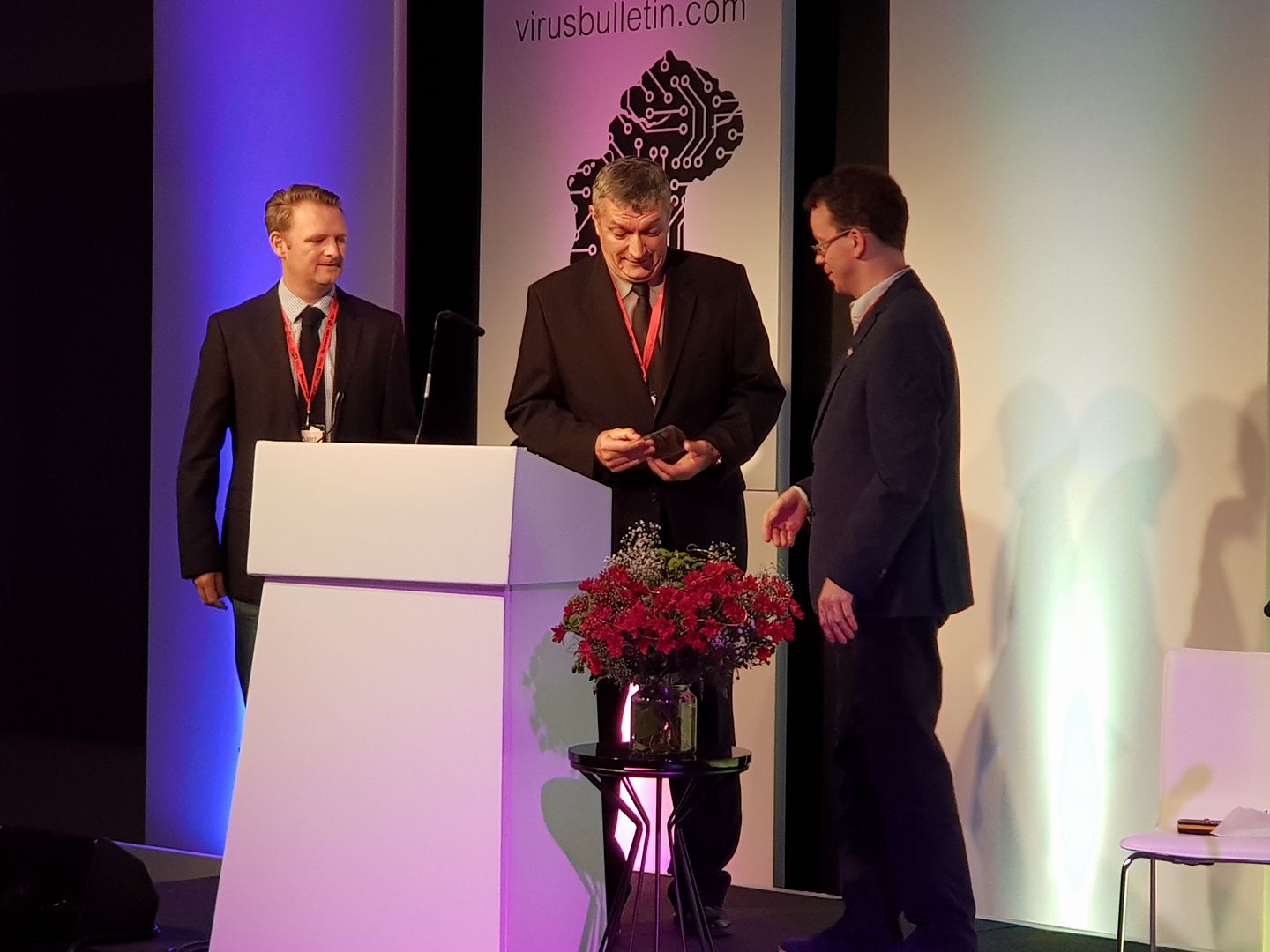Posted by Martijn Grooten on Nov 3, 2017
 Trickbot, a banking trojan which appeared this year, seems to be a new, more modular, and more extensible malware descendant of the notorious Dyre botnet trojan. At VB2017, Symantec researcher Andrew Brandt presented a walkthrough of a typical Trickbot infection process, and its aftermath, as seen through the lens of a tool used to perform man-in-the-middle decryption. Today, we publish both Andrew's slides and the recording of his presentation.
Trickbot, a banking trojan which appeared this year, seems to be a new, more modular, and more extensible malware descendant of the notorious Dyre botnet trojan. At VB2017, Symantec researcher Andrew Brandt presented a walkthrough of a typical Trickbot infection process, and its aftermath, as seen through the lens of a tool used to perform man-in-the-middle decryption. Today, we publish both Andrew's slides and the recording of his presentation.
Posted by Martijn Grooten on Nov 2, 2017
Today, we publish a short paper in which CERT Société Générale presents FAME, its open source malware analysis framework.
Read morePosted by Martijn Grooten on Oct 31, 2017
Ebury and Mayhem, two families of Linux server malware, about which VB published papers back in 2014, are still active and have received recent updates.
Read morePosted by Martijn Grooten on Oct 27, 2017
Crypton, a tool developed by F5 Networks researchers Julia Karpin and Anna Dorfman, aims to speed up the reverse engineering process by decrypting encrypted content found in a (malicious) binary. The researchers described the tool in a paper which they presented at VB2017 in Madrid. Today, we publish both the paper and the recording of their presentation.
Read morePosted by Martijn Grooten on Oct 25, 2017
 For many people, the threat of an abusive partner or ex-partner is very real - and the market for consumer spyware worryingly large. Today, we publish the recording of a presentation on the subject of consumer spyware given at VB2017 by The Daily Beast reporter Joseph Cox.
For many people, the threat of an abusive partner or ex-partner is very real - and the market for consumer spyware worryingly large. Today, we publish the recording of a presentation on the subject of consumer spyware given at VB2017 by The Daily Beast reporter Joseph Cox.
Posted by Martijn Grooten on Oct 23, 2017
 At the VB2017 gala dinner, the fourth Péter Szőr Award was presented to Sophos researcher Gábor Szappanos for his paper "AKBuilder – the crowdsourced exploit kit".
At the VB2017 gala dinner, the fourth Péter Szőr Award was presented to Sophos researcher Gábor Szappanos for his paper "AKBuilder – the crowdsourced exploit kit".
Posted by Martijn Grooten on Oct 20, 2017
 We publish the VB2017 paper and video by Kaspersky Lab researchers Juan Andres Guerrero-Saade and Costin Raiu, in which they look at fourth-party collection (spies spying on other spies' campaigns) and its implications for attribution.
We publish the VB2017 paper and video by Kaspersky Lab researchers Juan Andres Guerrero-Saade and Costin Raiu, in which they look at fourth-party collection (spies spying on other spies' campaigns) and its implications for attribution.
Posted by Martijn Grooten on Oct 11, 2017
 Virus Bulletin is a company - and a conference - with a mission: to further the research in and facilitate the fight against digital threats. To help us in this mission, we want to hear from those who didn't come to Madrid. What is your impression of the VB Conference? What did you think of this year's programme? And why couldn't you come to Madrid?
Virus Bulletin is a company - and a conference - with a mission: to further the research in and facilitate the fight against digital threats. To help us in this mission, we want to hear from those who didn't come to Madrid. What is your impression of the VB Conference? What did you think of this year's programme? And why couldn't you come to Madrid?
Posted by Martijn Grooten on Oct 10, 2017
 Last week, we announced the full details of VB2018, which will take place 3-5 October 2018 at the Fairmont The Queen Elizabeth hotel in Montreal, Quebec, Canada.
Last week, we announced the full details of VB2018, which will take place 3-5 October 2018 at the Fairmont The Queen Elizabeth hotel in Montreal, Quebec, Canada.
Posted by Virus Bulletin on Oct 5, 2017
 In a special guest blog post, VB2017 Silver sponsor Cisco Umbrella writes about a paper that researchers Dhia Mahjoub and David Rodriguez will present at the conference this Friday.
In a special guest blog post, VB2017 Silver sponsor Cisco Umbrella writes about a paper that researchers Dhia Mahjoub and David Rodriguez will present at the conference this Friday.